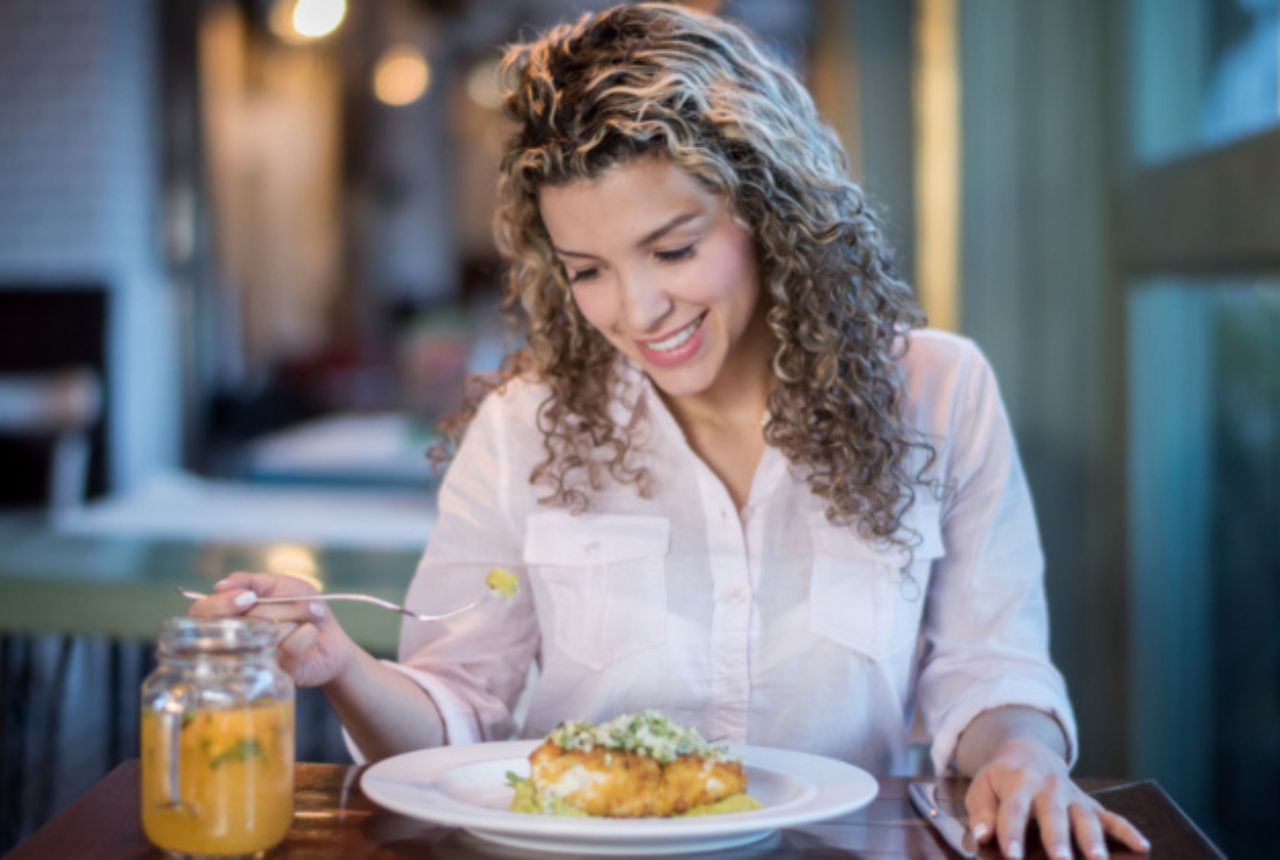People Who Eat Alone in Public Without Feeling Self-Conscious Often Display These 9 Unique Traits
We’ve all seen it. Someone sitting alone at a café, restaurant, or park bench, enjoying their meal without a care in the world.
No awkward glances, no self-conscious fidgeting—just a person at peace with their solitude.
You might have even found yourself wondering: How can they do it?
How can they sit alone in public, savoring their food, without feeling like every eye in the room is on them?
For many of us, eating alone in public can feel like a daunting task.
The societal pressure to be always surrounded by others, to never be seen alone, can make solo dining seem like an uncomfortable, even shameful, experience.
Yet, there’s a unique group of individuals who not only embrace dining solo but do so with a sense of confidence, ease, and joy that most of us can only dream of.
What is it about these people that makes them so comfortable in their own skin?
What sets them apart from the rest of us who struggle to enjoy a meal without worrying about how we look or how others might perceive us?
It turns out, those who can eat alone in public without feeling self-conscious often possess certain qualities that not only help them navigate the act of solo dining but also enhance their overall approach to life.
In this post, we’ll explore the nine distinct traits that these confident solo diners share.
By delving into these characteristics, we’ll not only discover what makes them so comfortable in their own company, but we’ll also uncover valuable lessons that can inspire us to embrace our own moments of solitude with confidence and grace.
So, let’s dive in and learn what makes these individuals so unapologetically themselves.
1) They Exude Self-Confidence
Eating alone in public isn’t always easy.
Get Smarter Everyday Join Us On WhatsApp
In a world where social gatherings and shared meals are the norm, being the person sitting solo at a table can sometimes feel like a public display of loneliness.
Yet, those who comfortably dine alone seem to have cracked the code.
What’s their secret? The answer lies in one word: self-confidence.
But let’s be clear: this isn’t about arrogance. It’s not about strutting around with an air of superiority or pretending to be something you’re not.
Rather, it’s about a quiet, unshakeable belief in their own worth. People who eat alone without hesitation don’t seek validation from others.
They know who they are, and they don’t need external approval to enjoy a simple meal.
This confidence goes beyond just their dining habits.
It touches every aspect of their life. When they face challenges, they tackle them with a calm assurance that they can handle whatever comes their way.
They don’t shrink under criticism; they stand firm in their beliefs.
They’re not swayed by public opinion, and this steadiness is what makes them so magnetic.
So, next time you spot someone enjoying their meal alone, take a moment to admire their confidence.
What you’re seeing is a person who has learned to be comfortable with who they are—and that’s something truly special.
2) They’re Comfortable with Solitude
Think back to the last time you found yourself alone in public. How did it feel? If you’re like most people, it probably didn’t come with a sense of ease.
Maybe you kept your eyes on your phone, avoiding contact with others, or even felt that familiar sense of discomfort creeping in.
But for those who regularly dine solo, solitude isn’t something to fear—it’s something to embrace.
Get Smarter Everyday Join Us On WhatsApp
Consider my friend Jake, who once surprised me with his ability to sit alone at a busy food court without a second thought.
While our group searched for seating together, Jake casually went off on his own, found a spot, and dug into his meal—no anxiety, no self-consciousness.
It was like he had a natural comfort with being alone that many people spend their lives searching for.
Being comfortable with solitude isn’t just about sitting by yourself; it’s about cultivating a sense of inner peace and contentment.
People who are at ease when dining alone don’t view it as a negative experience.
They aren’t seeking out others to fill the silence; they’ve mastered the art of enjoying their own company.
Solitude, for them, is not a source of loneliness, but an opportunity for reflection, quiet joy, and self-sufficiency.
If you can relate to Jake’s ability to embrace being alone, then you know that it comes with incredible benefits.
You’re not dependent on others for your happiness or fulfillment.
You learn how to be self-reliant and discover the beauty of your own thoughts.
It’s a trait that enhances not just your dining experience, but your overall quality of life.
3) They’re Open to New Experiences
Ever notice how people who eat alone in public seem to have a certain openness to the world?
It’s almost as if they’re daring to break free from the mold, unafraid to defy societal expectations.
Research shows that individuals who embrace the act of dining solo often exhibit an openness to new experiences—one of the key traits that psychologists associate with personal growth.
Get Smarter Everyday Join Us On WhatsApp
This isn’t just about trying new foods or dining in unfamiliar places (though that’s part of it).
It’s about the willingness to step out of your comfort zone and embrace life on your own terms.
People who eat alone tend to have a curiosity that extends far beyond the dining table.
They’re the ones who will explore unfamiliar cities, try new hobbies, and meet new people—all without needing someone by their side to validate the experience.
This openness to new experiences isn’t limited to eating habits—it’s a broader worldview.
They don’t shy away from challenges; they lean into them. They’re not afraid of discomfort or uncertainty.
Instead, they see these as opportunities for growth and self-discovery.
Whether it’s traveling solo, taking on a new project, or trying something completely outside of their usual routine, they approach life with a sense of wonder and possibility.
Being open to new experiences is not just an attitude—it’s a way of life.
And for those who dine alone without hesitation, it’s a trait that brings richness and fulfillment to every moment, making each new experience feel like an adventure.
4) They Have a Strong Sense of Self
There’s something undeniably magnetic about people who are comfortable dining alone in public.
It’s not just their confidence or ease with solitude that stands out; it’s their strong sense of self.
These individuals have cultivated a deep understanding of who they are and what they value.
They don’t feel the need to seek validation or approval from others, especially when it comes to something as simple as eating a meal alone.
In a world that constantly pressures us to fit in, to conform, and to follow the crowd, it’s a rare and admirable quality to be so secure in your own identity.
Get Smarter Everyday Join Us On WhatsApp
People who can sit alone without a second thought don’t feel the need to perform or change to suit anyone else’s expectations.
They know what they like, what they stand for, and they aren’t afraid to embrace that—even if it means going against the grain.
This strong sense of self doesn’t just shape their dining habits; it impacts how they live their lives.
They make decisions based on their own values and beliefs, rather than on what others think.
They don’t give in to peer pressure or societal norms. Instead, they carve out their own path, confidently navigating life on their own terms.
The freedom that comes from this sense of self is contagious.
When you witness someone who lives authentically, it inspires you to do the same.
So, next time you’re sitting alone at a café, take a moment to celebrate your own unique identity, knowing that embracing who you are is a powerful act in itself.
5) They’re Self-Reliant
Self-reliance is one of the most empowering traits that people who eat alone in public often possess.
To dine solo without a care in the world requires a certain level of independence—a belief that you can not only handle life’s challenges but also enjoy your own company without depending on others for comfort or validation.
For these individuals, being alone is never a burden; it’s an opportunity for self-sufficiency.
Self-reliance isn’t limited to the ability to enjoy a meal on your own; it’s a mindset that stretches far beyond the dining table.
People who are self-reliant have learned how to entertain themselves, process their thoughts, and make decisions independently.
They aren’t waiting for someone else to provide entertainment or happiness—they know how to create both for themselves.
Get Smarter Everyday Join Us On WhatsApp
This self-reliance breeds resilience.
When life presents challenges, they face them head-on, confident in their ability to adapt and overcome.
They don’t rely on others for emotional support or validation, because they’ve built a strong internal foundation that allows them to navigate life’s ups and downs with grace and composure.
Whether it’s dealing with setbacks at work or navigating the complexities of relationships, self-reliant individuals trust themselves to find solutions.
What’s more, this trait allows them to be more present in their daily lives.
When you’re not constantly looking to others for affirmation, you can fully engage with your experiences.
Eating alone becomes a fulfilling, enriching act—because you’re fully engaged with the moment, not distracted by the need for external approval.
6) They Value Their Own Company
One of the most beautiful aspects of those who eat alone in public without feeling self-conscious is their ability to truly value their own company.
It’s a rare skill to appreciate being alone without feeling the need to fill the silence with distractions or the presence of others.
Yet, for these individuals, solitude isn’t a void to be feared—it’s a space to be cherished.
For them, eating alone is a chance to connect with themselves.
It’s not about feeling isolated; it’s about savoring the opportunity to be present in the moment, free from external distractions.
As they eat, they might reflect on their day, enjoy the simple pleasure of a well-prepared meal, or just appreciate the peacefulness of their own thoughts.
There’s a quiet joy in these moments, a sense of contentment that comes from being comfortable in one’s own skin.
People who value their own company have developed an intimate relationship with themselves.
Get Smarter Everyday Join Us On WhatsApp
They know how to enjoy their own presence, whether they’re dining alone or spending time in other solo pursuits.
This doesn’t mean they’re antisocial or avoidant of relationships; rather, it means that they’ve learned to find fulfillment within themselves, without needing others to constantly fill their emotional needs.
This ability to value one’s own company is a trait that has a profound impact on overall well-being.
It enhances self-esteem, fosters independence, and nurtures a sense of inner peace.
And when you’re truly at peace with yourself, eating alone in public becomes less of a daunting task and more of a personal celebration of self-acceptance.
7) They Are Comfortable with Vulnerability
When you walk into a bustling restaurant, grab a table for one, and sit down to enjoy a meal solo, it can feel like you’re putting yourself on display.
There’s something inherently vulnerable about eating alone in public.
You’re not hiding behind the excuse of a companion or filling the space with small talk.
You’re simply there, present, exposed, and unapologetically enjoying your own company.
For many, this would be an uncomfortable experience, but for those who embrace it, it’s an act of courage.
Being comfortable with vulnerability is a rare and powerful trait.
It’s not about avoiding discomfort; it’s about accepting that discomfort is part of life—and learning to embrace it rather than shy away from it.
People who are comfortable dining alone in public understand that vulnerability is not weakness, but strength.
It’s a demonstration of emotional bravery, showing up as your true self without the safety net of others.
This comfort with vulnerability doesn’t just apply to eating alone.
Get Smarter Everyday Join Us On WhatsApp
These individuals are willing to be seen as they truly are, without putting on a facade or pretending to be someone they’re not.
Whether they’re engaging in an honest conversation, expressing their feelings, or facing a difficult challenge, they allow themselves to be open.
This authenticity is magnetic and creates deeper, more genuine connections with others.
When you’re comfortable with vulnerability, you stop worrying about what others think.
You start living your life more fully, embracing both the highs and the lows.
Dining alone in public is just one of many ways to practice this emotional freedom.
And those who are able to do it effortlessly inspire us all to let go of our fears and show up as our real selves.
8) They’re Mindful
There’s a special kind of mindfulness that comes with eating alone, especially in a public setting.
With no distractions, no conversations pulling your attention away, you can truly savor the moment.
You become attuned to the flavors of your meal, the sounds around you, the textures, and the simple pleasure of nourishment.
It’s a practice of being present, of truly engaging with the world around you in an intentional, focused way.
People who eat alone in public often exhibit a heightened sense of mindfulness.
They are able to immerse themselves in the experience of eating, appreciating the nuances of their meal in a way that’s difficult when distracted by others.
Every bite becomes an opportunity to practice mindfulness—to savor the present moment, without the rush or need to be elsewhere.
Get Smarter Everyday Join Us On WhatsApp
This mindfulness extends far beyond dining habits. Individuals who practice mindfulness in one area of their life tend to carry it over into other aspects as well.
They become more attuned to their thoughts, their emotions, and their surroundings.
They take the time to appreciate the small, beautiful moments that others might overlook—the way the sun filters through the window, the sound of the wind rustling the trees, or the peacefulness of a quiet room.
Mindfulness not only enhances the quality of their experiences but also cultivates a deeper sense of gratitude and contentment.
They learn to find joy in simplicity, in just being, in the here and now.
For these individuals, eating alone is more than just a meal—it’s a practice of mindful living, a chance to connect with the present moment in a way that fosters peace and fulfillment.
9) They’re Unapologetically Themselves
Perhaps the most defining trait of those who eat alone in public without feeling self-conscious is their authenticity.
They are unapologetically themselves.
In a world where we are often pressured to conform, to blend in, or to mold ourselves to fit societal expectations, these individuals stand out because they refuse to apologize for who they are.
They don’t need to explain themselves, nor do they feel the need to make excuses for their choices.
This authenticity is evident in every aspect of their lives. They choose activities based on what brings them joy, not what others might think.
Whether it’s eating alone at a restaurant, traveling solo, or pursuing a passion that doesn’t fit the mainstream, they do it because it’s true to who they are.
They don’t feel the need to fit into a prescribed role or live up to external expectations.
They’re perfectly comfortable being themselves, and that confidence is liberating.
Being unapologetically yourself is more than just a personal trait—it’s a way of life. It’s about living authentically, without fear of judgment or rejection.
Get Smarter Everyday Join Us On WhatsApp
These individuals remind us that it’s okay to be different, to march to the beat of your own drum, and to take joy in doing what makes you happy, regardless of whether others approve.
In a world that often demands conformity, there’s something truly refreshing about someone who isn’t afraid to be themselves.
It’s a reminder that we don’t have to fit into a mold to be worthy, valuable, or successful.
Being unapologetically yourself is not just a trait—it’s a mindset, a liberation that allows you to live life on your terms.
If you found this blog post insightful be sure to share it with those out there that are still not aware of it Don't forget to FOLLOW US on Facebook and hit the LIKE button for more new content. Thanks so much for reading.....






